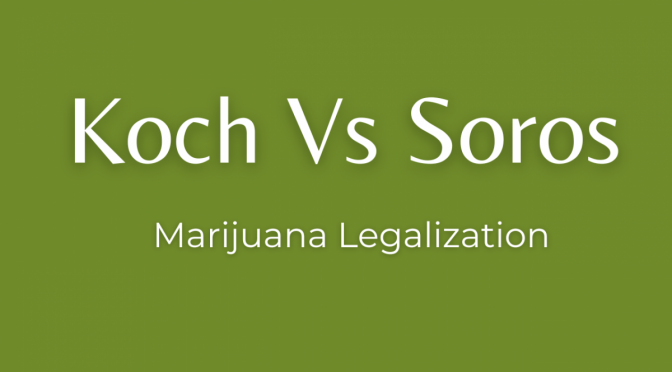Politicians take sides when it comes to marijuana legalization. A Koch model believes that marijuana legalization offers new ways to make money (good for the economy), while a Soros model wants to undo the “war on drugs,” which the US abandoned long ago. Read Part I. Follow us by email to get our blog articles.
The first two states to legalize, Colorado and Washington, may illustrate the differences. Colorado has always been a libertarian free-for-all of legalization. (However, Colorado has been forced to put warning labels on products over 10% THC, resulting in the largest downturn ever seen.
Washington State, on the other hand, used an ACLU lawyer to write its ballot and Soros bankrolls the ACLU. The ACLU cares deeply that minorities are incarcerated at higher rates than white Americans.
However, Washington may have to crack down on its marijuana industry too. A leaked scientific report from Washington recom-mends raising the age requirement for high-potency products to 25.
The battle cry of the Soros model is social justice and turning the moniker “War on Drugs” into a problem. Helped by the Drug Policy Alliance, it ignores individual and societal consequences like traffic deaths, mental illness and addiction. It works very well on voters who want to aid the cause of social justice, a term that is popular but vague. (Soros heavily funded the Drug Policy Alliance and brought it into the powerful position it holds today.)
Politicians in opposition: Nancy Mace vs. Cory Booker
Representative Nancy Mace of South Carolina promotes the Koch model, a program pushed by the corporate world and Jeff Bezos who owns the Washington Post. It would respect states’ rights.
Nancy Mace voted against the MORE Act in April, a Democratic bill to remove marijuana from its Schedule I designation. She cited the heavy-handedness of federal government and felt it would not give states the power to opt out.
Even if Democrats control the Senate now, a few Democratic senators would block marijuana legalization.
The Soros model is promulgated by those who preach that legalization is about social justice. Senators Schumer, Wyden and Booker take this side. The group asks to include the expungement of all prior marijuana convictions in any legalization program. Senator Cory Booker wants it to include equity provisions by financing ways for minorities to get into the industry.
But what happens when states legalize?
Early on, Soros and the Drug Policy Alliance said legalization would put cartels out of business. The exact opposite happened in California, where the illegal markets for marijuana exploded after legalization.
The city of Oakland, California, made minority ownership front and center of its cannabis policy. However, one social justice owner in Oakland said they make no more than $50,000 a year. It’s jarring to push the idea that a drug that is harmful to individuals and communities should be used to advance the cause of equity.
Both the corporate and small business models fail to protect our children, and both models make the addiction crisis in this country much worse. Last year more than 108,000 people died of drug overdose (mainly fentanyl), not to mention the number whose drug-related deaths fall into other categories: homicide, suicide, crashes and accidental deaths. Only two states with legalization, Vermont and Connecticut, put THC potency caps on cannabis. But, even that cap is 60%, which is 12x stronger than the average marijuana of the 1990s.
Another failure of state legalization is demanding in-state ownership. An appellate court ruled against Maine’s in-state residency requirement for ownership. When northern states demand cannabis to be grown in the state, they misunderstand problems with mold and the exorbitant electricity demands.
Monopolies dominate the industry
Interstate cannabis companies command a lot of power. The marijuana cultivating facility responsible for the death of an employee in Massachusetts is owned by Truleive, a Florida company. Another Florida company owns multiple facilities in Virginia. These outsiders wait to pounce, if and when the states license commercial pot shops.
Recently, the owner of Curaleaf, the world’s largest cannabis company, called on the industry to model itself on Big Tobacco. Altria, the former Philip Morris company, hopes that happens too!
What is CPEAR?
Coalition for Cannabis Policy, Education, and Regulation (CPEAR) the cannabis interest group set up by Andrew Freedman, John Hudak and Staci Gruber, pretends to bridge the gap between large and small players. According to the website, its “mission is to advance a comprehensive federal regulatory framework for cannabis.” Tom Daschle and Greg Walden, former politicians, represent the Republican and Democratic Parties on the Board.
CPEAR’s members include Altria, the tobacco company, Constellation Brands and Molson Coors. Don’t underestimate its corporate power! Smart Approaches to Marijuana disputes CPEAR’s white paper.
When the Public Broadcasting System sponsored a NOVA Program on the Cannabis Question, September 29, 2021, CPEAR’s funders informed the content.
They could have consulted IASIC or Smart Approaches to Marijuana, if they wanted truthful content. We called out PBS for using Koch and Soros sources for their program. If only Americans knew how much megadonors control the press and our daily lives!
Although the filmmaker interviewed Dr. Jasmine Hurd, an outstanding scientist, the show pivoted away from science and into criminal justice. When Dr. Nora Volkow brought up the between psychosis and cannabis, the film altogether avoided that science!
Marijuana lobbyists can’t win on the science, but they can win by convincing people that millions are in jail for marijuana.
Consolidation happens and monopolies win.
True Philanthropy
To be truly philanthropic, we suggest that billionaires can fund drug rehabilitation programs for our families who can’t afford them. To reduce incarceration, they could fund programs to reduce recidivism, rather than confuse the criminal justice system.

